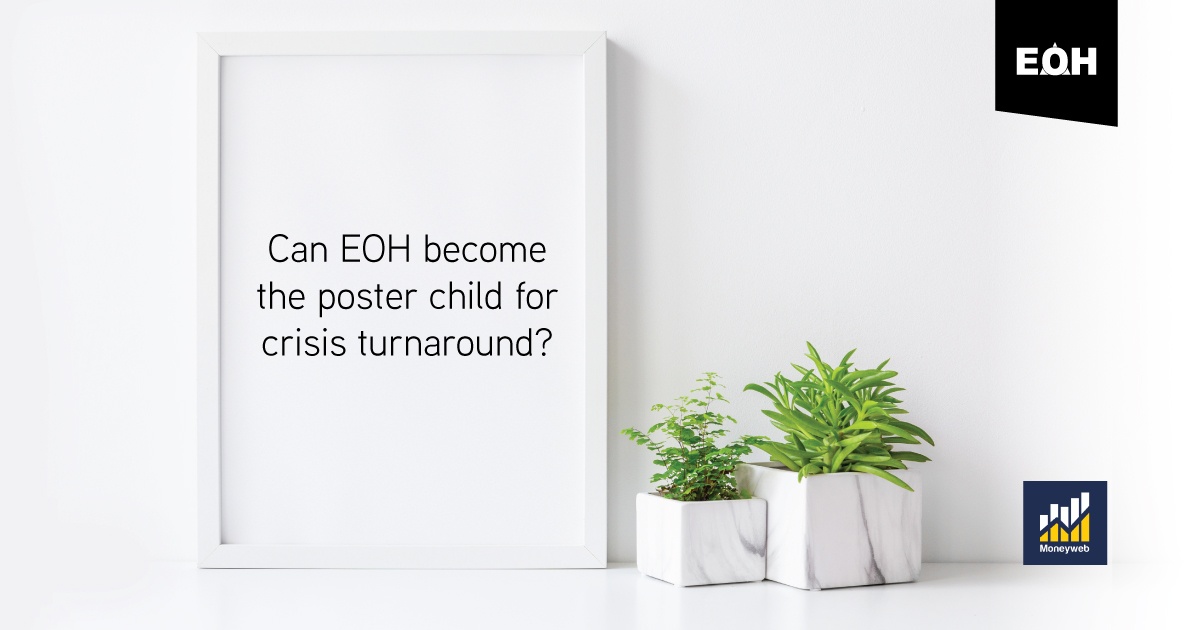Following its dramatic fall from grace, EOH’s new management team has dug in deep, swept clean and driven a commendable operating turnaround. I have full respect for the excellent job they have done here.
It is not an easy task to turn a service firm around:
- Service firms tend to trade based on reputation (services are consumed before anyone knows whether the service was good or not, thus reputation is key for prospective customers deciding to use a service).
- Also, a service firm’s major asset is its employees, but the best employees at a struggling service firm tend to jump ship first (their own reputations make them mobile and easy to poach by competitors).
None of this is EOH’s current management’s fault, and every credit must be given to them for the job they have achieved so far.
I do get the feeling that both of these aspects of the business have been stabilised through transparent and thorough market communication backed up by forensic audits and aggressive legal actions. The fact that the group has won 441 public sector deals worth R3.1 billion is evidence of this.
Read: Can EOH become the poster child for crisis turnaround?
Unfortunately, these aren’t the only challenges facing the group …
A key element of EOH’s turnaround has been degearing its hugely debt-laden balance sheet, and management has been forced to do so with asset sales.
In its results for the year to end-July 2021, EOH reported its debt dropping to R2 billion (2020: R2.4 billion), and once the Sybrin proceeds are received (around R334 million), its debt should lower to around R1.7 billion.
Unfortunately, its 2021 earnings before interest, tax, depreciation and amortisation (Ebitda) of R667 million converted into free cash flow of only R275 million (R404 million operating cash flow less PPE and intangible additions), and a whopping R229 million of this was used to merely pay interest costs during the period.
That does not leave much free cash flow for paying back capital on its debt.
Pros and cons of asset sales
Hence, it is likely that EOH still needs to sell assets to degear.
This is a two-edged blade as selling parts of the group could realise cash to degear with, but should mean a smaller continuing operation left behind (in this case, ‘assets’ are probably businesses and software that generate revenue).
Interestingly, the group’s property leases expire in 2023. Thus, there is the potential for overhead rationalisation and negative rental reversion gains to be made here, though how material is anyone’s guess.
Shifting our focus to the group’s 2021 income statement, its latest results already reveal a smaller enterprise, albeit with much better-quality business.
While revenue looks like it collapsed, this is misleading as business disposals and the close-out of loss-making legacy contracts accounted for approximately 75% of the revenue decline (indeed, the group’s gross and operating margins rose, reflecting the truth of this).
More importantly, the group’s 2021 ‘base revenue’ (total revenue excluding the impacts of the legacy issues clean-up, as well as liquidated and sold assets) decreased by only 11% to R7.2 billion (2020: R8.1 billion).
Unfortunately, the group still reported a net loss.
Read:
While the net loss was almost entirely driven by its huge interest bill (operating profit was positive), given the explanation above of the two-edged blade that is asset sales, one cannot simply disregard this in attempting to work out what the group’s sustainable profit may be going forward.
While EOH does appear to be operationally stabilised, management is honest that debt remains the central risk.
Firstly, they say that “reducing the debt burden remains a critical focus for the management team”, before going on to mention that “as part of our path to deleverage and create a sustainable capital structure for the business, we have focused on exiting non-performing, non-core and certain IP [intellectual property] businesses”.
One thing is almost certain: once, or if, EOH sufficiently degears, it should be a much smaller group.
* Keith McLachlan is investment officer of Integral Asset Management
* Some Integral Asset Management clients may hold EOH shares.
